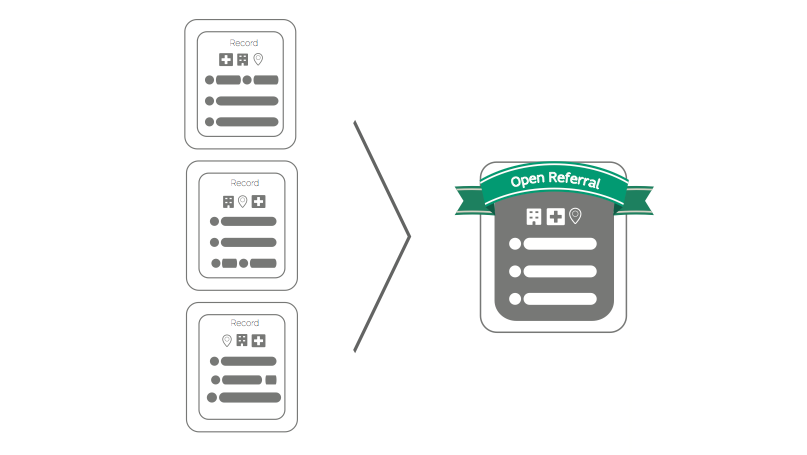We’re pleased to announce the release of version 1.0 of the Human Services Data Specification (HSDS, also known as the Open Referral format).
Read the specification here: Google Docs and Github.
The purpose of HSDS is to make it easy for community resource directory data to be exchanged among different kinds of information systems, in order to make information about helpful services easier to produce, find, and use.
HSDS is designed to establish interoperability among existing systems that aggregate and distribute community resource directory data (such as AIRS-compliant information-and-referral providers) — as well as with the web’s search engines (through compatibility with the ‘civic services schema’ recently adopted by the World Wide Web Consortium).
We believe this is a necessary step forward on a path towards new solutions to the complex challenge of community resource directory data.
It’s just a first step, of course.
As we walk this path together, through a series of Open Referral pilot projects, this format will serve as a foundation for the development of new tools and the discovery of new institutional models that can sustainably produce data that is reliable and openly accessible.
With a common data language, we believe that database administrators can work together to find new ways to answer the old question of “how can we maintain the quality of our directory database over time?”
When referral systems use this model to become open platforms, we believe it will become easier to develop and re-use new and more effective tools that help service providers connect their clients with resources that meet their needs.
When resource data is predictably structured and readily accessible, we believe that researchers, analysts, and decision-makers will become better informed about the allocation of resources in a community, and in turn, better able to identify and address un-met needs.
Finally, as it becomes easier to publish and find resource data, it will be easier for help-seekers to find critical information that can help them live healthier and happier lives.
◊
HSDS v1.0 has been developed through multiple phases of community input, as well as some initial field testing.
This is just one step on a long journey, yet it’s worth celebrating. Special thanks to our lead developer, Sophia Parafina, as well as our most active commenters in the final rounds:
Neil McKechnie – iCarol
Declan Frye – Purple Binder
Andrew Lomax – Bread for the City
Charles Koppelman-Milstein – Polaris
Moncef Belyamani – Ohana Project
Rory Gianni – Code for All
David Henderson – Family Independence Initiative
Paul Mackay – FolkLabs
Devin Balkind – NYC:Prepared
Hailey Pate – Code for Sacramento Brigade and the California Emergency Medical Systems Authority
Would you like to learn more about this specification, the Open Referral Initiative as a whole, and how it can all be useful for you and your community? Join us on Friday March 13th, for an Open Referral Orientation (12p PST / 3p EST), where we’ll provide a top-to-bottom introduction to interested newcomers.


Leave a Reply